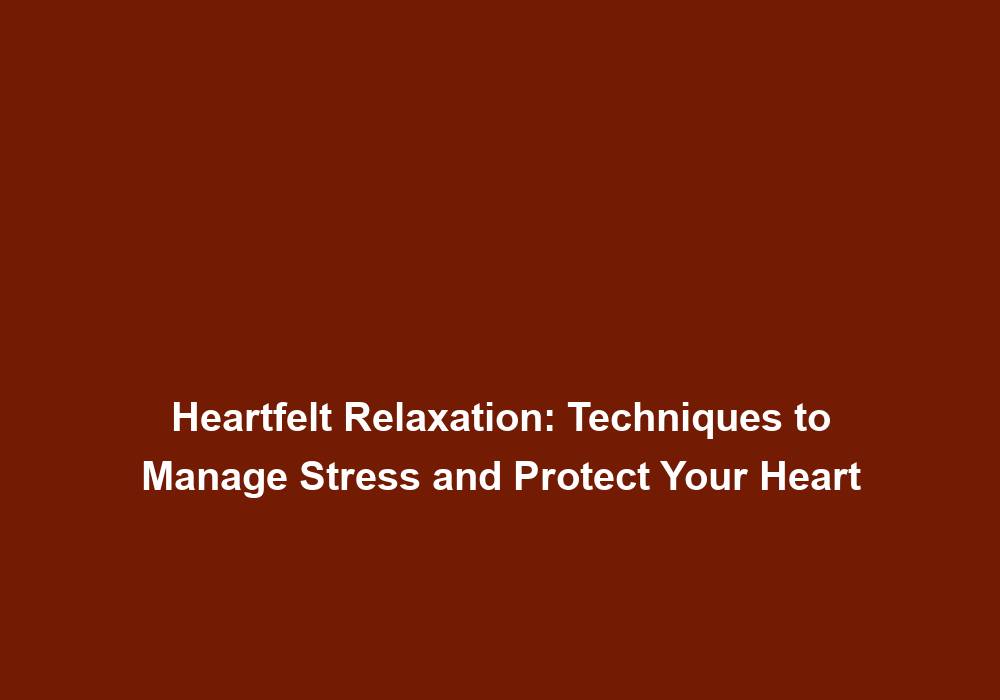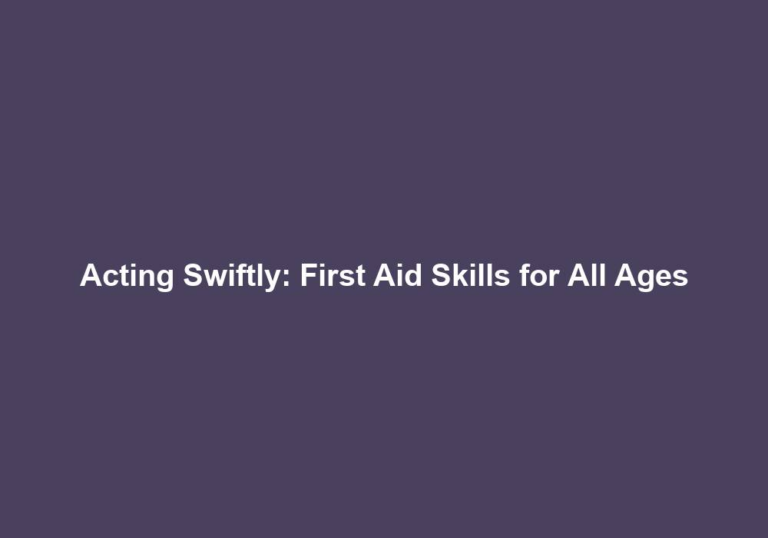Heartfelt Relaxation: Techniques to Manage Stress and Protect Your Heart
Stress has become an inevitable part of our lives, affecting not only our mental well-being but also our physical health, particularly our heart. When stress becomes chronic, it can lead to an array of cardiovascular problems, including high blood pressure, heart disease, and even heart attacks. Therefore, it is crucial to prioritize stress management techniques that promote relaxation and protect our heart health.
In this article, we will explore a variety of techniques that can help you manage stress effectively, leading to heartfelt relaxation and improved heart health.
1. Practice Deep Breathing Exercises
Deep breathing exercises are simple yet powerful techniques that can help calm your mind and relax your body. It involves taking slow, deep breaths, filling your lungs completely, and then exhaling slowly. Here’s a step-by-step guide to practicing deep breathing:
- Find a quiet and comfortable place to sit or lie down.
- Close your eyes and focus on your breath.
- Inhale deeply through your nose, feeling your diaphragm expand.
- Hold your breath for a few seconds, and then exhale slowly through your mouth.
- Repeat this process for several minutes, allowing yourself to let go of any tension or stress with each breath.
Deep breathing exercises can reduce the stress hormone cortisol in your body, lower your heart rate, and promote a sense of calmness.
When you practice deep breathing, you activate the body’s relaxation response, which counteracts the effects of stress. This technique helps regulate your autonomic nervous system, specifically the sympathetic nervous system responsible for the fight-or-flight response. By consciously controlling your breath, you stimulate the parasympathetic nervous system, triggering a relaxation response. Deep breathing also increases oxygen intake, promoting better circulation and oxygenation of tissues, including the heart. This, in turn, supports heart health and reduces the risk of cardiovascular problems.
In addition to the step-by-step guide, you can enhance your deep breathing practice by incorporating specific breathing techniques. For example, you can try abdominal breathing, where you focus on expanding your abdomen as you inhale and contracting it as you exhale. Another technique is box breathing, where you inhale for a count of four, hold for four, exhale for four, and hold again for four before repeating the cycle. Experiment with different techniques to find what works best for you and incorporate them into your daily routine for optimal stress management and heart health.
2. Engage in Regular Physical Activity
Regular physical activity is not only essential for maintaining a healthy heart but also plays a significant role in managing stress. Engaging in exercise releases endorphins, known as feel-good hormones, which can boost your mood and relieve stress. Consider the following activities to incorporate into your routine:
- Cardiovascular exercises such as brisk walking, jogging, or cycling.
- Yoga or Pilates for a combination of physical movement and mindfulness.
- Strength training to improve overall fitness and release tension.
When you engage in regular physical activity, you not only strengthen your cardiovascular system but also improve your body’s ability to handle stress. Exercise helps increase blood flow, delivering oxygen and nutrients to your organs, including the heart. This improved circulation contributes to better heart health and reduces the risk of heart disease.
Furthermore, physical activity promotes the release of endorphins, which are natural painkillers and mood elevators. These chemicals help alleviate stress, anxiety, and depression, providing a sense of well-being and relaxation. Regular exercise also helps regulate the stress hormone cortisol, reducing its levels in the body. By incorporating cardiovascular exercises, yoga, Pilates, or strength training into your routine, you create an outlet to release tension and stress, ultimately protecting your heart and promoting overall well-being.
3. Prioritize Quality Sleep
Sleep is an essential component of stress management and maintaining a healthy heart. When we sleep, our bodies have a chance to repair and regenerate, including our cardiovascular system. Here are some tips to improve the quality of your sleep:
- Establish a consistent sleep schedule by going to bed and waking up at the same time every day.
- Create a peaceful sleep environment by eliminating distractions and ensuring a comfortable temperature.
- Avoid consuming caffeine or engaging in stimulating activities close to bedtime.
- Practice relaxation techniques, such as meditation or reading a book, to unwind before sleep.
Quality sleep is vital for stress management, as it allows your body to recover from the day’s stressors and prepares you for the challenges ahead. During sleep, your heart rate and blood pressure decrease, giving your cardiovascular system a break. This restorative phase helps reduce the risk of heart disease and promotes overall heart health.
Establishing a consistent sleep schedule regulates your body’s internal clock, known as the circadian rhythm, ensuring you get the recommended amount of sleep each night. Creating a peaceful sleep environment, free from distractions and at a comfortable temperature, enhances the quality of your sleep. Avoiding caffeine and stimulating activities close to bedtime helps calm your mind and prepare it for relaxation. Additionally, practicing relaxation techniques, such as meditation or reading a book, can help shift your focus away from stressors, promoting a sense of calmness that aids in falling asleep and staying asleep. By prioritizing quality sleep, you can reduce stress levels, improve your heart health, and wake up feeling refreshed and energized.
4. Embrace Mindfulness and Meditation
Mindfulness and meditation are powerful tools to cultivate a sense of inner peace and manage stress effectively. These practices involve focusing your attention on the present moment, accepting your thoughts and emotions without judgment. Here’s how you can incorporate mindfulness and meditation into your routine:
- Find a quiet and peaceful space where you can sit comfortably.
- Close your eyes and bring your attention to your breath, observing each inhale and exhale.
- Allow thoughts to come and go without attaching to them, gently bringing your focus back to your breath.
- Start with short sessions, gradually increasing the duration as you feel more comfortable.
Mindfulness and meditation help train your mind to be fully present, reducing stress and promoting a sense of calmness. By focusing on your breath or an anchor point, you redirect your attention away from worries and anxieties, allowing your mind to relax. Regular practice of mindfulness and meditation has been shown to reduce stress, lower blood pressure, and improve overall heart health.
In addition to the basic meditation technique described above, you can explore various meditation styles to find what resonates with you. This may include guided meditation, where you listen to a recorded voice guiding you through the practice, or mantra meditation, where you repeat a specific word or phrase to enhance focus and relaxation. As you become more comfortable with meditation, you can gradually increase the duration of your sessions, aiming for consistency rather than length. By embracing mindfulness and meditation as part of your stress management routine, you can cultivate a state of inner peace and protect your heart health.
5. Cultivate Healthy Lifestyle Habits
Adopting a healthy lifestyle can significantly contribute to stress management and protect your heart. Consider the following habits to incorporate into your daily life:
- Maintain a balanced diet rich in fruits, vegetables, whole grains, and lean proteins.
- Limit your intake of processed foods, sugary beverages, and excess salt.
- Avoid smoking and limit alcohol consumption.
- Stay hydrated by drinking an adequate amount of water throughout the day.
- Engage in activities that bring you joy and promote relaxation, such as hobbies, spending time with loved ones, or practicing self-care.
A healthy lifestyle forms the foundation for stress management and heart health. A balanced diet provides essential nutrients that support your body’s functions, including the cardiovascular system. Incorporating fruits, vegetables, whole grains, and lean proteins into your meals ensures you receive a variety of vitamins, minerals, and antioxidants that promote heart health and reduce the risk of heart disease. On the other hand, limiting processed foods, sugary beverages, and excess salt helps prevent inflammation and maintain optimal blood pressure levels.
Avoiding smoking and limiting alcohol consumption are crucial for protecting your heart and overall well-being. Smoking damages blood vessels and increases the risk of heart disease, while excessive alcohol consumption can lead to high blood pressure and other cardiovascular problems. Staying hydrated by drinking an adequate amount of water throughout the day supports proper bodily functions, including stress management.
Engaging in activities that bring you joy and promote relaxation is an essential aspect of stress management. Hobbies, spending time with loved ones, or practicing self-care activities like taking baths, reading, or listening to music can help you unwind and alleviate stress. By making conscious choices that prioritize your overall well-being, you can effectively manage stress and safeguard your heart health.
In conclusion, managing stress is essential for protecting your heart and promoting overall well-being. By incorporating techniques such as deep breathing exercises, regular physical activity, quality sleep, mindfulness and meditation, and cultivating healthy lifestyle habits, you can achieve heartfelt relaxation and maintain a healthy heart. Prioritize self-care and stress management, making them an integral part of your daily routine, to enjoy a more balanced and fulfilling life. Remember, your heart deserves the utmost care and attention.







